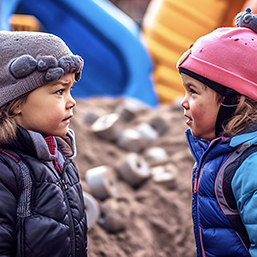
“Be a good friend!”
What is in a ‘good friendship’? Friendships are tricky! Children must have the skills to manage and maintain the good moments, while also being able to navigate the inevitable issues that will arise (let’s be honest, even adults struggle with the issues of friendships sometimes!).
And let’s not forget that all of these skills develop at different times on a developmental timeline. So, a child who is a ‘good friend’ at three will have very different skills than a good friend at eight. Our expectations need to adjust and accommodate for that.
But even with our best attempts, children can end up experiencing conflict in their friendships. It’s common for children to be the best of playmates one second and at each other’s throats the next. We might ask ourselves, “How do I support my child? How can I respond to the other child? How can I model good friendship skills?” During these moments, it can be tricky to know what to do and how to help. Here are some of our favorite tips and tricks to actively support your child during a conflict with their friend(s):
Label the feelings: give a name to everyone’s feelings. It helps them feel seen and heard. It’s validating for your child to hear that it is perfectly normal that they feel frustrated, hurt, sad, or worried about the situation.
Explain what you see: narrate the scene back to both children. What did you see? How did they feel? What happened next? Try to leave your perspective out of it and just state the facts.
Encourage perspective taking: encourage your child to stand in the shoes of their friend. How do you think they were feeling? How do you think what you said or did impacted them? Depending on the age of your child this practice might look differently, as perspective taking is a skill that develops through childhood. For younger children, you might do more of the narrating, “I wonder if your friend felt this way.” For older children, you can expect a bit more self-reflection. “What do you think your friend was thinking about when this happened?” Teaching your child to look at conflicts from different angles can help with critical thinking and problem solving.
Problem solve together: some of the best ways to resolve an issue is to get input from everyone involved. Sometimes, we underestimate a child’s ability to think of a solution to a problem, but when we invite them to problem solve with us, they can come up with some pretty creative solutions. How should we move on from this situation? What should we do differently next time? Honor their ideas and help them build a solution.
Provide the language: remember that behavior is communication. Sometimes we need to remind them of the prosocial language they should be using, to help replace the behaviors they are currently choosing to utilize. Provide language to support them in turn-taking, asking for a toy back, getting an adult for help, expressing their feelings, and self-advocacy. Practicing simple phrases on the drive to school or as you debrief the day before bedtime can help your child feel confident that they have the tools they need when they next see their friends.
Have a plan for next time: if you’re noticing that there are certain times where conflict is more prevalent, for example, during certain games or activities, try to be proactive and have a plan before conflict occurs.
Try being in close proximity, or discuss how to manage tough situations before they start an activity (i.e. losing a game, not following the rules, etc).
While adults have had years and years to practice being a “good friend,” remember your child is still actively learning these skills. The friendships they have in Kindergarten will be very different from the friendships they have developed by Grade 6, and that is perfectly normal. This is the perfect age ato encourage them to come to you with any friendship concerns, so as they get older and friendships become more complex, they feel safe coming to you for advice. Helping your child to navigate the inevitable ups and downs of friendships gives them valuable tools to use in relationships for years to come.
Ashlee and Lisa are child psychologists who created KidsConnect Psychology as a place for children and families to access tools, supports, and therapy. Check out our website for digital downloads, parenting tool kits, information about our parent counseling, school consultations, daycare consultations, and more! kidsconnectpsychology.com. Follow us on Facebook and Instagram at KidsConnect Psychology.
See our related articles:
Calgary’s Child Magazine © 2024 Calgary’s Child